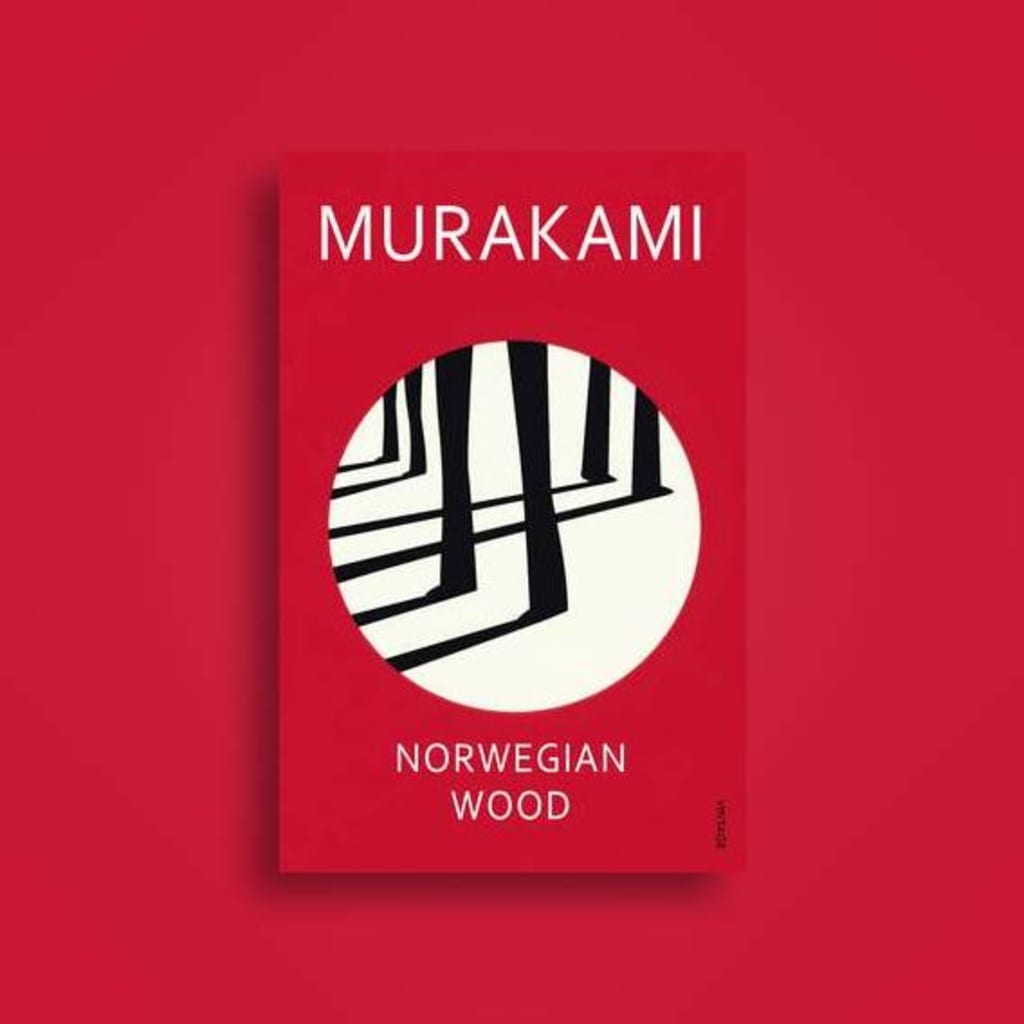
Norwegian Wood by Haruki Murakami: 4/5
(Spoiler Free)
Norwegian Wood is about Toru Watanabe who hears the song "Norwegian Wood" by the Beatles and is suddenly transported back to the 1960s when he was a university student and in love with a girl named Naoko. The novel centers around their relationship and how Watanabe is forced to choose between first love Naoko and the new exciting rebellious Midori, who quite literally marches into his life. Haruki Murakami is a brilliant writer and perfectly captures an honest depiction of love in a way that is not cheesy or overly romantic. He shows us that love is not always suddenly looking at everything with rose-tinted glasses, and he brutally demonstrates the agony that love can sometimes cause. The character of Toru Watanabe is easily one of my most favorite literary characters purely for the fact that, even though we see the stories through his eyes, we do not really know much about him—just like the other characters in the novel. This creates a paradoxical feeling of being inside Toru’s head but also watching him from the outside like a friend accompanying him on his journey of adolescence. Naoko, Reiko, and Midori are incredibly fleshed out and interesting characters with heartbreaking backgrounds that drive the plot forward. I thought, however, that the characters Nagawasa and Hatsumi could have had a little more light shed on their relationship—especially Hatsumi could have had more scenes so that her plot points meant more to the story. The story is one filled with heartbreak, humor, and philosophy. It easily became one of my favorite books a few chapters in, and I genuinely put off reading it a few times just because I did not want it to end so soon. This is my first Murakami book, and I will definitely be re-visiting his works again.
(Spoilers ahead)
As a huge fan of The Beatles, the title instantly drew me in, and I was pleasantly surprised to see that it was not just used a song that gave Toru flashbacks. The lyrics of the song perfectly describe the relationship between Toru and Naoko in the first lines: “I once had a girl, or should I say, she once had me.” Naoko never loved Toru. It was clear from the beginning that Kizuki was the only one she truly loved. That could be an explanation for why she referred to having sex with Toru as being “violated” and was unable to become aroused with him after that night. It was also understandable that Kizuki’s death affected and changed both Naoko and Toru in many ways, which inevitably brought them closer as a way to cope which led to Toru falling in love and Naoko using him as a sort of comfort blanket. I do not think she did so with harmful intentions, but she did cause Toru a lot of pain through pulling and pushing him like a child does with a toy that they don’t want but don’t want anyone else to have.
Midori’s character was one that I had a love-hate relationship with. I loved her strong presence and thought she provided some much needed comedic relief with her light-hearted demeanor and general interactions with Toru at first. However, as the novel went on I began to dislike the way she treated Toru, especially when she saw that he was extremely depressed yet ignored him because he was too sad to notice her new hair. Toru was always there for her, and I think that having them fall out over that was a small and petty thing to do—it did show that she was insecure just like everyone else, although she tried not to be, but I felt that there was probably a better way to depict that.
Reiko’s background could have been a short story all on its own. It was captivating and the twist was so good I was on the edge of my seat waiting for her to finish the story. Apart from that and her playing the guitar, I didn’t really care about her character that much and felt like she was more of an idea that Murakami had in the back of his head, and he wanted to release her out into the world somehow. The awkward sex scene with her and Toru was random and very abrupt. This was especially true since, up until that point, we were let in on everything that he was thinking, yet when it came to them having sex all he said was “I was just thinking the same thing,” and so we didn’t get to understand his reasoning behind the decision. I do really love her character, but I felt she was out of place in the story. However, I have a theory about her place in the story which, if I am correct about, would make me take back every criticism I’ve just given about her character. The theory goes like this:
I believe that Reiko murdered Naoko—because, if she did, then the way Naoko “killed herself” and the fact Reiko had sex with Toru would make way more sense. Now some may argue that Reiko and Toru’s relationship was purely platonic and that is why they were able to have sex and be so open and comfortable with each other. However, I just don’t think that’s plausible. I may dedicate a post to going more in-depth with this theory, as it is one that I can never really ignore.
The ending of Norwegian Wood is an obscure open-ended question. Toru calls Midori, finally ready to talk to her. However, we are not told whether or not this is in the present day (when Toru is on the plane having the flashback) or whether it is shortly after the events with Reiko. Midori asks Toru, “Where are you?” to which Toru cannot answer. “Where was I now?” he asks himself and the reader, and the book ends. It could be a literal question, the reader knows that Toru can sometimes be so inside himself he doesn’t really know what’s going on around him. However, it could be a more philosophical question. Toru—at whatever stage of his life he is asking this question—doesn’t know and never really knew where he is. He was always disconnected, and at some points more than others we can either assume he ended up with Midori and is just ready to talk to her about all the things he was keeping from her or that, after his flashback, he realised how much he needed Midori with him and so is reaching out to her years later. Either way, Murakami’s book leaves us with a lot of questions and a lot of answers that do not match up, which makes repeated readings even more rewarding, depending on your outlook at the time. A more positive reading would center around Toru reconnecting with Midori or finally discovering who he is, whilst a negative reading would suggest Naoko’s illness found its way to Toru and him not knowing where he is and him calling out to Midori “from the dead centre of this place that was no place”—from either death or the new constant state of confusion he will find himself in, just like Naoko.






Comments
There are no comments for this story
Be the first to respond and start the conversation.